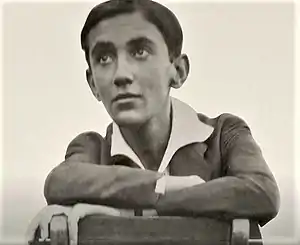
Roberto Bazlen, also known as Bobi Bazlen (10 June 1902 – 27 July 1965) was an Italian writer and publicist.
Biography
Bazlen was born in Trieste on 10 June 1902. His father, Eugenio Bazlen, a Lutheran native of Stuttgart, died one year after his birth, and he was raised by the family of his mother, Clotilde Levi Minzi, from Trieste, belonging to the Jewish middle class.[1] He studied in the German language school Real Gymnasium, where he became passionate about literary subjects, encouraged by his teacher, Professor Mayer. After he left Trieste, he lived in Genoa, Milan and Rome.
He was a friend of Luciano Foà, Adriano Olivetti, Giacomo Debenedetti, Italo Calvino and Eugenio Montale,[2] and part of the circle of artists of the Caffè Garibaldi together with Umberto Saba, who in 1921 dedicated his Canzoniere to his "six readers" Bazlen, Romanellis, Giotti, Schiffrer, Rovan and Bolaffio.[3][4] It was Bazlen who recommended to Montale Svevo's Confessions of Zeno (of which he was one of the first discoverers).[5]
Bazlen never published anything in life, but a posthumous collection of his writings (1984, which also includes his letters to Montale) included works like Lettere editoriali (1968), Note senza testo (1970) and Il capitano di lungo corso.[6][1] Bazlen's life is at the center of the novel Lo stadio di Wimbledon (1983) by Daniele Del Giudice, which was adapted to film by Mathieu Amalric under the title Le stade de Wimbledon (2002).
Roberto Calasso's final monograph, published the day after his death, was devoted to the subject of Bazlen's life and study.[7]
References
- 1 2 Grasso, Andrea. "Bazlen, Roberto". Enciclopedia Italiana. Archived from the original on 12 May 2021. Retrieved 12 May 2021.
- ↑ La Poesia di Eugenio Montale: Atti, Università di Genova, Le Monnier 1984, p.131
- ↑ Pizzi, Katia (2002). A City in Search of an Author. Bloomsbury Publishing. pp. 57–58. ISBN 9780567244970.
- ↑ Coslovich, Barbara (November 2018). "Ruggero Rovan e la scultura a Trieste nel primo Novecento" (PDF). Fondazione CRT. p. 1-162. Retrieved 11 May 2021.
- ↑ Marisa Strada introduzione in Italo Svevo, Senilità Giunti Editore, 1995
- ↑ Elio Pecora, La scrittura immaginata, Guida Editori 2009, p.32
- ↑ "Roberto Calasso, Italian publisher and literary figure, dies". AP NEWS. 2021-07-30. Retrieved 2021-11-03.